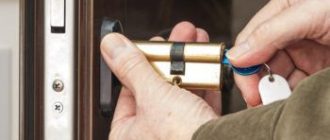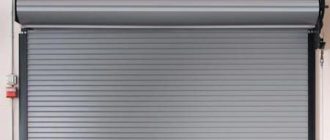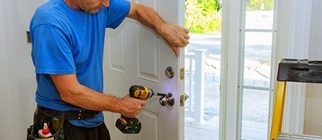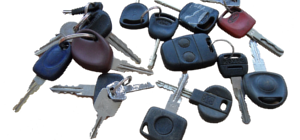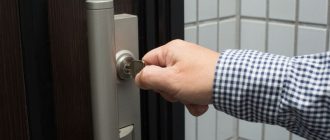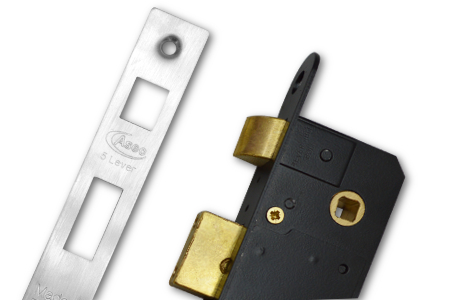
Mortise Locks: How They Work and What Benefits Can They Offer
Mortise locks are a type of door lock that you might be familiar with if you’ve ever lived or worked in an older building. These locks are known for their durability and strength, making them a popular choice for both residential and commercial applications. The name “mortise” refers to the way the lock is installed into the edge of the door, creating a secure fit.
One of the main benefits of mortise locks is their superior level of security. These locks work by using a combination of a key and a deadbolt mechanism, providing an added layer of protection against forced entry. With their robust construction and intricate design, mortise locks offer a high level of resistance to picking and tampering.
Additionally, mortise locks offer a number of functional advantages. They provide a smooth and seamless operation, allowing you to lock and unlock your door with ease. The mechanism of a mortise lock also makes it possible to easily change the lock cylinder, providing flexibility and convenience.
In conclusion, mortise locks are known for their outstanding functionality and numerous advantages. Whether you want to enhance the security of your home or business, or simply enjoy the convenience and ease of use that mortise locks offer, these locks are an excellent choice.
Understanding Mortise Locks
Mortise locks are an essential component of door security. They work by fitting into a rectangular pocket, or “mortise,” cut into the edge of a door. This pocket provides a secure foundation for the lock mechanism, allowing it to operate effectively.
Mortise locks offer several advantages over other types of locks. Firstly, their design provides a higher level of security compared to surface-mounted locks. The deeper and more secure installation within the door makes it more difficult for intruders to tamper with or force the lock open.
Additionally, mortise locks are known for their durability and longevity. The solid construction and quality materials used in their manufacturing ensure that they can withstand wear and tear over time. This makes them a reliable choice for both residential and commercial applications.
Furthermore, mortise locks provide a variety of locking functions, giving users greater control and flexibility. They can feature combination locks, keyless entry systems, or traditional key and turn mechanisms. This versatility allows for customization based on security needs and preferences.
In conclusion, understanding mortise locks is essential for anyone looking to enhance door security. By offering increased security, durability, and various locking options, mortise locks are a popular choice for both residential and commercial applications.
How Mortise Locks Work
Mortise locks are sophisticated and highly secure locks that offer many benefits. These locks are commonly found in residential and commercial buildings due to their durability and reliability.
The basic design of a mortise lock consists of a rectangular box, known as the mortise, which is installed into a recess in the edge of a door. The mortise contains the various components of the lock, including the latch bolt, deadbolt, and locking mechanism.
When the mortise lock is engaged, the latch bolt extends from the edge of the door into the strike plate, which is installed on the door frame. This provides a secure lock and prevents the door from being easily forced open.
In addition to the latch bolt, mortise locks often include a deadbolt for extra security. The deadbolt is typically operated by a key or thumbturn and extends to further secure the door in place.
One of the key advantages of mortise locks is their ability to be operated from both sides of the door. This allows for easy entry and exit, making them suitable for high-traffic areas or emergency exits.
Mortise locks are also highly customizable, allowing for different finishes and designs to match the style of the building. Additionally, they can be easily rekeyed or replaced if needed.
In summary, mortise locks offer a high level of security and functionality. Their design and construction make them an excellent choice for both residential and commercial applications.
Different Types of Mortise Locks
Mortise locks come in a variety of types, each offering its own unique benefits. Whether you need a lock for your front door, interior doors, or even cabinets, there is a mortise lock that will work for you.
Here are some of the different types of mortise locks:
1. Cylinder Mortise Locks: These locks have a cylinder that houses the mechanism and can be easily replaced when needed. They offer enhanced security and are commonly used on exterior doors.
2. Passage Mortise Locks: These locks are used on interior doors and do not have a locking mechanism. They provide privacy and help maintain the integrity of the door’s appearance.
3. Deadbolt Mortise Locks: Deadbolt mortise locks offer the highest level of security. They have a sturdy construction and feature a deadbolt that extends deep into the door frame, preventing forced entry.
4. Sliding Door Mortise Locks: Sliding door mortise locks are specially designed for sliding doors and offer ease of use and security. They are commonly used on patio doors and provide an added layer of protection.
5. Cabinet Mortise Locks: These locks are specifically designed for use on cabinets and drawers. They offer enhanced security for keeping valuable items and sensitive documents safe.
Each type of mortise lock offers its own benefits and is suited for different applications. Choosing the right type of lock will depend on your specific security needs and the type of door or cabinet you are securing.
Benefits of Using Mortise Locks
Mortise locks offer several benefits that make them a popular choice for securing doors:
- Superior Security: Mortise locks are known for their high level of security. The mechanism is designed to fit into the door, making it difficult for intruders to force open. The solid construction and deadbolt feature provide added protection against break-ins.
- Durable and Long-lasting: Mortise locks are made from high-quality materials, such as solid brass or steel, which ensures their durability and longevity. They are designed to withstand heavy use and can withstand extreme weather conditions.
- Enhanced Aesthetics: Mortise locks come in a variety of finishes and designs, allowing you to choose one that matches your door and overall decor. The visible plate and knob add an elegant touch to any door.
- Smooth Operation: The internal components of a mortise lock are precision-engineered, resulting in a smooth and effortless operation. The key turns with ease, and the latch engages smoothly, providing a hassle-free user experience.
- Versatility: Mortise locks can be used on various types of doors, including residential and commercial doors. They are suitable for both interior and exterior doors and can be installed on single or double doors.
- Convenient Key Control: Mortise locks can be rekeyed easily, allowing you to change the key without replacing the entire lock. This feature is especially useful in situations where you need to grant or revoke access to certain individuals.
Overall, mortise locks offer a combination of security, durability, aesthetics, and convenience, making them an excellent choice for any door.
Factors to Consider When Choosing a Mortise Lock
When it comes to choosing a mortise lock, there are several important factors to consider. These factors can greatly affect the functionality and effectiveness of the lock, and ultimately determine its suitability for your needs.
One factor to consider is the level of security that the mortise lock offers. Different locks have different levels of security, so it is important to determine what level of security you require for your specific application. Consider factors such as the type of door you have and the level of protection you need.
Another factor to consider is the type of locks that are available. Mortise locks come in various types, including classroom locks, storeroom locks, and apartment locks, among others. Each type of lock is designed to offer specific functionality, so it is important to choose the right type of lock for your specific needs.
The way in which mortise locks work is another important factor to consider. Mortise locks work by inserting a key into a cylinder, which turns and activates the locking mechanism. Understanding how the lock operates can help you determine if it is suitable for your needs and if it offers the level of convenience you require.
Lastly, it is important to consider the overall quality and durability of the mortise lock. Look for locks that are made from high-quality materials and have been tested to meet industry standards. A durable lock will not only offer increased security but also stand the test of time.
In conclusion, when choosing a mortise lock, it is important to consider factors such as security level, lock type, functionality, and durability. By carefully considering these factors, you can ensure that you choose the right mortise lock for your specific needs and enjoy the benefits it offers.
Installation Process of Mortise Locks
Installing mortise locks requires careful attention to ensure proper function and security. Follow these steps to properly install a mortise lock:
- Begin by preparing the door surface. Clean the area where the lock will be installed to remove any dirt or debris that may interfere with the lock’s operation.
- Determine the location for the mortise lock. Measure and mark the spot on the door edge where the lock will sit. Ensure that the location allows for smooth operation of the lock mechanism.
- Use a chisel to create a mortise pocket. Carefully cut out a rectangular pocket in the door edge according to the lock specifications. Make sure that the pocket is deep enough to accommodate the lock body.
- Install the lock body. Insert the lock body into the mortise pocket, ensuring that it fits flush with the door surface. Secure the lock body in place using screws or bolts provided with the lock.
- Install the lock trim. Attach the lock trim to the door surface using screws or bolts provided. Ensure that the trim is aligned properly and secured tightly to the door.
- Test the lock. Check the lock’s functionality by turning the key and operating the latchbolt. Ensure that the lock operates smoothly and securely.
- Make any necessary adjustments. If the lock does not operate correctly, adjust the strike plate, trim, or other components to ensure proper alignment and function.
- Verify security. Double-check that the lock provides the desired level of security by testing it against external force. Ensure that the latchbolt engages properly and that the lock cannot be easily forced open.
Following these steps will ensure a properly installed mortise lock that offers reliable functionality and enhances the security of your door.
Tips for Maintaining Mortise Locks
Mortise locks are durable and reliable locks that offer excellent security. To keep your mortise locks in top working condition and to maximize their benefits, it’s important to perform regular maintenance. Here are some tips to help you maintain your mortise locks:
- Regularly clean the lock and keyhole with a soft brush or cloth to remove dust and debris.
- Apply a lubricant, such as graphite powder or a silicone-based lubricant, to the keyhole and moving parts of the lock. This will help to prevent friction and ensure smooth operation.
- Check the screws and fasteners on the lock and door plate to make sure they are secure. Tighten any loose screws as needed.
- Inspect the strike plate on the door frame to ensure it is properly aligned with the lock. If it’s misaligned, adjust it so that the lock functions properly.
- Test the lock regularly by inserting the key and turning it to ensure that it operates smoothly.
- Keep the lock mechanism protected from excessive moisture or water, as this can cause rust and damage.
- If you notice any issues or problems with the lock, such as difficulty turning the key or a loose handle, address them promptly to prevent further damage.
By following these maintenance tips, you can ensure that your mortise locks remain in good condition and continue to provide the security and functionality you need.
Common Issues with Mortise Locks
Mortise locks offer a variety of benefits, but like any other type of lock, they are not without their potential issues. Here are some common issues that can arise with mortise locks:
1. Difficulty in Installation: Mortise locks require precise installation in order to function properly. Improper installation can lead to issues such as misalignment and difficulty in locking or unlocking the door.
2. Wear and Tear: Over time, mortise locks can experience wear and tear, especially in high-traffic areas. This can result in key sticking or difficulty in turning the knob or lever.
3. Rust or Corrosion: Moisture and exposure to the elements can cause rust or corrosion to develop on the metal components of mortise locks. This can affect the smooth operation of the lock and potentially lead to it becoming jammed.
4. Key Breakage: Keys can break off inside the lock, especially if excessive force is applied. This can render the lock unusable and require professional assistance to remove the broken key and repair the lock.
5. Lockout Situations: Accidentally locking yourself out of your property is a common issue regardless of the type of lock. In the case of mortise locks, it can be particularly frustrating as they are typically more complex to open without a key.
While these issues can occur, it is important to note that proper maintenance, regular lubrication, and professional installation can help prevent many of these problems. If any issues do arise, it is recommended to consult a locksmith or qualified professional for assistance.
Upgrades and Smart Features for Mortise Locks
Mortise locks are a popular choice for many homeowners and businesses due to their durability and high level of security. However, advancements in technology have allowed for various upgrades and smart features to be added to mortise locks, making them even more convenient and efficient.
One of the key upgrades that mortise locks now offer is the ability to be integrated with smart home systems. This means that homeowners can control and monitor their locks remotely using their smartphones or other smart devices. With this feature, you can easily lock or unlock your door from anywhere, making it a convenient solution for those who frequently forget to lock their doors or need to grant access to someone when they are not at home.
In addition to remote control, smart mortise locks can also provide you with real-time notifications. You will receive alerts on your phone whenever someone opens or closes your door, giving you peace of mind and the ability to keep track of who is coming and going from your home or business. This feature can be especially useful for parents who want to monitor when their children arrive home from school or for business owners who want to keep track of employee access.
Another smart feature that mortise locks can offer is the ability to create and manage user codes. This eliminates the need for physical keys and allows you to give unique access codes to individuals who need temporary access to your property. This can be useful for guests, cleaners, or contractors. You can easily create and delete user codes as needed, providing you with greater control over who has access to your property.
Mortise locks with smart features typically require power to work. While some models may be battery-powered, others may require a wired connection. It is important to consider which option will work best for your needs and ensure that you have a reliable power source available.
| Remote control | Convenience and peace of mind |
| Real-time notifications | Enhanced security and monitoring |
| User code management | Flexible access control |
Overall, the upgrades and smart features available for mortise locks can greatly enhance their functionality and advantages. Whether you want the convenience of remote control, the security of real-time notifications, or the flexibility of user code management, there is a smart mortise lock available to meet your needs. Consider these features when choosing a mortise lock for your home or business to ensure you have the best possible security solution.
History and Development of Mortise Locks
Mortise locks have a long and rich history, dating back to ancient times. The concept of a lock that could slide into a door to secure it originated in ancient Mesopotamia and Egypt, where wooden locks were used.
Over the centuries, the design and functionality of mortise locks evolved. The Romans and Greeks further developed the concept, using metal keys and more intricate mechanisms. However, it wasn’t until the Middle Ages that mortise locks became more widely adopted in Europe.
During the Renaissance, locksmiths began to refine the design of mortise locks, making them more durable and secure. The Industrial Revolution further spurred development, with advancements in manufacturing techniques enabling mass production of mortise locks.
The benefits of mortise locks are numerous. One of their primary advantages is their reliability and strength. Due to their design, mortise locks offer a higher level of security compared to other types of locks. Their construction allows for the use of thicker and more robust materials, making them more resistant to brute force attacks.
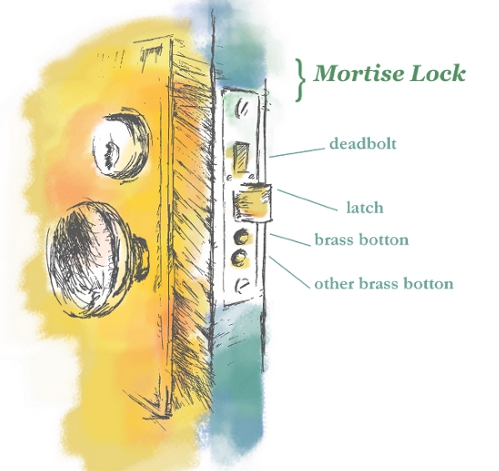
Additionally, mortise locks are known for their durability. Their internal mechanisms are designed to withstand extensive use, ensuring longevity and reliability. This makes mortise locks an excellent choice for high-traffic areas or locations where security is of utmost importance.
Today, mortise locks continue to be a popular choice for both residential and commercial applications. Their long history of development and the benefits they offer make them a reliable and secure option for securing doors.
| Benefits of Mortise Locks: |
| 1. Higher security level |
| 2. Durability and longevity |
| 3. Resistance to brute force attacks |
| 4. Strong construction materials used |
| 5. Suitable for high-traffic areas |
Frequently Asked Questions about Mortise Locks
What is a mortise lock?
A mortise lock is a type of lock that is installed within the body of a door and consists of a lock body, a strike plate, and a key-operated knob or lever. It is known for its durability and strength.
How does a mortise lock work?
A mortise lock works by utilizing a key to operate a series of internal levers and springs within the lock body. When the correct key is inserted and turned, the levers are lined up at a specific height, allowing the lock bolt to retract and open the door.
What advantages do mortise locks offer?
Mortise locks offer several advantages over other types of locks. They are known for their durability and strength, making them highly resistant to forced entry. Additionally, they provide a higher level of security due to their complex internal mechanisms. Mortise locks also offer a wide range of styles and finishes to match any door aesthetic.
Are mortise locks suitable for any type of door?
Mortise locks are versatile and can be installed on various types of doors, including wooden, metal, and glass doors. However, it is important to ensure that the door is thick enough to accommodate the lock body and strike plate.
Can mortise locks be installed by homeowners?
While it is possible for homeowners to install mortise locks themselves, it is recommended to hire a professional locksmith for proper installation. Professional locksmiths have the experience and expertise to ensure the lock is correctly installed for optimal functionality and security.
Can mortise locks be rekeyed?
Yes, mortise locks can be rekeyed. A professional locksmith can rekey the lock by changing the internal pins and springs to match a new key, rendering the old key ineffective.
Comparing Mortise Locks with Other Types of Locks
When it comes to choosing the right lock for your doors, you may have come across various options. One popular type of lock is the mortise lock. Let’s compare mortise locks with other types of locks and see what benefits they offer.
Mortise locks vs. Cylinder locks:
- Mortise locks provide better security compared to cylinder locks due to their stronger construction and built-in deadbolt mechanism.
- Mortise locks are harder to pick or tamper with, making them more resistant to break-ins.
- Mortise locks offer more customization options in terms of design and finishes, allowing homeowners to match their aesthetic preferences.
Mortise locks vs. Rim locks:
- Mortise locks are more secure because they require a pocket to be cut into the door, making it more difficult to force open.
- Mortise locks have a greater number of key combinations compared to rim locks, reducing the risk of someone having the same key.
- Mortise locks are generally more durable and long-lasting compared to rim locks.
Mortise locks vs. Deadbolt locks:
- Mortise locks have a built-in deadbolt mechanism, providing an extra layer of security compared to traditional deadbolt locks.
- Mortise locks offer a higher level of resistance against forced entry attempts due to their stronger construction.
- Mortise locks are available in a wider range of designs and finishes compared to deadbolt locks, allowing for more customization options.
Overall, mortise locks offer a combination of security, durability, and aesthetic appeal that sets them apart from other types of locks. Whether you are looking to upgrade your home security or enhance the visual appeal of your doors, mortise locks are an excellent choice.
Choosing the Right Mortise Lock for Your Needs
Mortise locks are a popular choice for securing doors due to the benefits they offer. These locks work by utilizing a mortise, or pocket, that is carved into the edge of the door. The lock mechanism is then inserted into this pocket, providing a secure and durable way to lock the door.
When it comes to choosing the right mortise lock for your needs, there are several factors to consider. First and foremost, you need to think about the level of security you require. Mortise locks are known for their strength and resistance to forced entry, making them an excellent choice for high-security applications.
Additionally, you should consider the aesthetics of the lock. Mortise locks are available in a variety of finishes and styles, allowing you to choose one that complements the design of your door and overall decor.
Furthermore, functionality is an important aspect to consider. Mortise locks can be equipped with various features, such as keyless entry systems or multiple locking points, to enhance convenience and security.
To ensure you select the right mortise lock, it can be helpful to consult with a professional locksmith. They have the knowledge and expertise to guide you through the selection process and recommend a lock that meets your specific needs.
| Level of security required | Strength and resistance to forced entry |
| Aesthetics | Available in various finishes and styles |
| Functionality | Features such as keyless entry systems or multiple locking points |
| Consulting a professional locksmith | Guidance and recommendations based on expertise |
Q&A:
What is a mortise lock?
A mortise lock is a type of lock that is installed within the door itself rather than being surface mounted. It consists of a lock body and a lockset, which is usually a doorknob or lever. This type of lock is known for its strength and durability.
What are the advantages of mortise locks?
Mortise locks offer several advantages. Firstly, they provide enhanced security due to their sturdy construction and the fact that they are installed within the door. Additionally, they offer a variety of options in terms of design and hardware finishes, allowing for customization to match different styles and preferences. Lastly, mortise locks are generally considered more aesthetically pleasing than other types of locks.
How do mortise locks work?
Mortise locks work by using a key to rotate the lock cylinder, which in turn operates the latch or bolt within the lock body. This latch or bolt extends into the doorframe, keeping the door secure when locked. The lockset on the door’s exterior is connected to the lock body through the door, allowing for the operation of the lock.
Can mortise locks be installed on any door?
Mortise locks can be installed on most doors that have a thick enough edge to accommodate the lock body. However, some doors, such as hollow core doors, may not be suitable for mortise lock installation as they lack the necessary thickness and material support. It is best to consult with a professional locksmith to determine if a door is compatible with a mortise lock.
Are mortise locks more expensive than other types of locks?
Mortise locks tend to be more expensive than other types of locks, such as cylindrical or tubular locks. This is due to their higher quality construction and materials. Additionally, mortise locks often require professional installation, which can add to the overall cost. However, the added security and durability that mortise locks offer make them a worthwhile investment for many homeowners and businesses.
What is a mortise lock?
A mortise lock is a type of locking mechanism that is installed within the body of a door. It consists of a lock body and a lock trim, which includes a handle or knob, keyhole, and any decorative elements.

